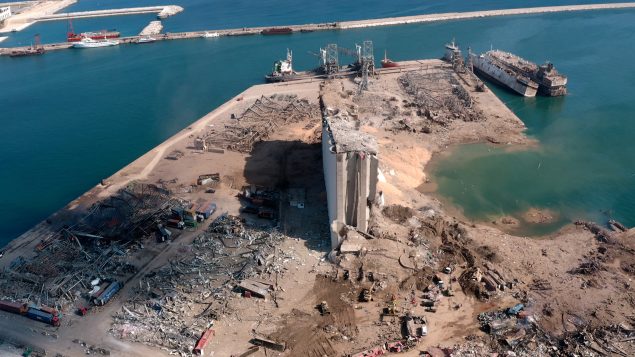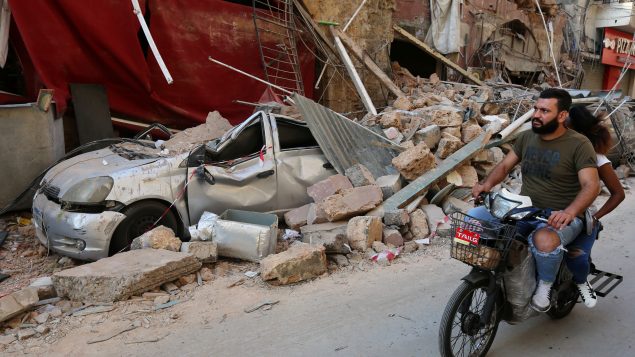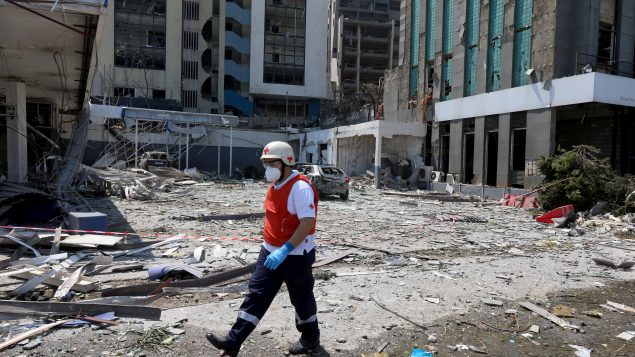Canada will provide assistance to Lebanon through “trusted multilateral partners,” International Development Minister Karina Gould said Thursday, addressing concerns that Canadian aid money might end up lining the pockets of corrupt Lebanese politicians instead of providing relief to those most in need.
While officials in Ottawa are in contact with their Lebanese counterparts, “no direct aid is planned from Ottawa to the Lebanese government,” she told reporters.
On Wednesday, the federal government announced $5 million in initial humanitarian assistance to Lebanon following a huge blast that rocked Beirut on Tuesday killing at least 135 people and injuring more than 5,000.
Of that sum $1.5 million will go immediately to Lebanese and Canadian Red Cross and other partners who are acting on the ground to help meet urgent needs such as food, shelter and emergency medical services, Gould said.
“Right now the priority is to save lives, we know that in the next 48 hours this is of the utmost concern and how we need to act,” Gould said.
“We know that there is the emergency and the urgent response that’s needed right now in Lebanon, but we also know that this is going to be a long-term reconstruction effort and I want to assure Canadians, Lebanese Canadians as well as the people of Lebanon that Canada will continue to be there for the long term.”
Canada concerned about economic crisis in Lebanon

A still image taken from a drone footage shows the damage two days after an explosion in Beirut’s port area, Lebanon Aug. 6, 2020. (Reuters TV/via REUTERS)
The federal government is increasingly worried about the financial situation in Lebanon and recognizes that the destruction of the port has exacerbated some of the challenges that Lebanon is already facing, Gould said.
“We are incredibly concerned about the food security crisis that was already something that was on our radar and we were working to support before this tragedy on Tuesday,” Gould said. “And of course, the destruction of the port will make the situation even worse.”
Officials at World Vision Canada echoed Gould’s concerns.
“The economic crisis of the past three years has dramatically impacted daily access to food and basic supplies and the spread of COVID-19 is taking a significant toll on the country’s health facilities,” said Lindsay Gladding, head of humanitarian programs at the Canadian branch of the international charity.
The port area, where the blast occurred, is a key hub for bringing in and housing vital stocks, such as essential food supplies and fuel, Gladding said.
“A shortage of these basic supplies will be devastating for Lebanese and refugee families that live in Beirut and throughout the country,” Gladding said.
Lebanon is already home to more than one million Syrian refugees and over 400,000 Palestinian refugees, representing the highest per capita proportion of refugees hosted by one country in the world, she added.
“Many of these refugees and other vulnerable children and families are invisible to official services; they need medical assistance, help finding somewhere to live, and immediate supplies of food and water,” Gladding said.

A man rides on a motorbike near rubble from damaged buildings following Tuesday’s blast in Beirut’s port area, Lebanon Aug. 6, 2020. (Aziz Taher/REUTERS)
In March, Lebanon defaulted on its foreign debt payments for time in its history. The value of its currency has plummeted, leading to widespread protests and unrest over government corruption and ineptitude.
Gould said Lebanon’s default on its debt repayments was of “great concern.”
“We’ve also seen the significant repercussions this had amongst the Lebanese people,” she said. “Canada is always willing to have conversations whether it’s with the G7 or the G20 or the multilateral development banks to see what we can do to assist Lebanon.”
However, any debt relief will be conditional on “very significant political and economic reforms,” she added.
“We’re having those conversations and certainly Tuesday’s events highlighted the urgency of making sure that Lebanon can get into a much better fiscal position,” Gould said.
‘Shocked and deeply saddened’

Volunteers clean the streets following Tuesday’s blast in Beirut’s port area, Lebanon Aug. 5, 2020. (Mohamed Azakir/REUTERS)
Prime Minister Justin Trudeau issued a statement on the disaster Thursday, saying Canadians are “shocked and deeply saddened” by the explosion. He vowed that Canada will help aid in the recovery.
“To the people of Lebanon, Lebanese Canadians, and all those who watched the explosion in shock and horror, worrying about their loved ones and friends: we will always support the people of Lebanon as you work to heal and rebuild your beautiful city. Canada will also work with the international community to keep identifying how we can support urgent needs, and continue to offer emergency support, including medical aid, food and shelter.
Trudeau said Canada and Lebanon share a “deep and longstanding friendship, which is rooted in close people-to-people ties,” and noted that hundreds of thousands of Lebanese Canadians live in communities across the country.
Canadians were shocked & deeply saddened by the devastating toll of Tuesday’s explosion in Beirut. We mourn the tragic loss of life, and wish a full & quick recovery to the thousands who were injured. We are with you, and will be there to help you overcome this tragedy.
— Justin Trudeau (@JustinTrudeau) August 6, 2020
According to the 2016 national census, 92,000 Canadians reported that they were born in Lebanon, and 219,555 reported being of Lebanese ethnic origin.
For Canadians who are in Lebanon, the Canadian embassy, which fortunately escaped relatively unscathed from the blast, will resume operations on Monday, Gould said.
In the meantime, Global Affairs Canada staff in Ottawa are providing consular support to Canadians in Lebanon right now, she added.
Canadians in need of consular assistance can call +1-613-996-8885 or email Global Affairs Canada at sos@international.gc.ca, she said.
The federal government is still assessing the situation regarding the possible need for repatriation of Canadian citizens in Lebanon, Gould said, adding that only 64 of about 11,000 registered Canadians in Lebanon have asked for assistance from Ottawa.
However, during the 2006 war between Israel and the Lebanese Shia militant group Hezbollah, the number of Canadians who wanted to get out of the country quickly swelled to over 39,000, according to a 2007 report by the Standing Senate Committee on Foreign Affairs and International Trade.
By the end of the crisis in July of 2006, approximately 14,370 people had been evacuated by the federal government in a complex operation that involved chartered cruise ships and aircraft.







For reasons beyond our control, and for an undetermined period of time, our comment section is now closed. However, our social networks remain open to your contributions.